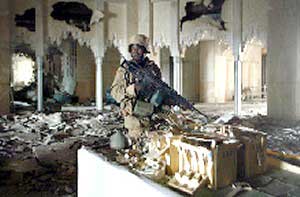It was the third straight day the Army penetrated Saddam's seat of power. This time, though, there were plans to stay. Rather than withdrawing at nightfall, as units did over the weekend, members of the 2nd Brigade of the 3rd Infantry Division hunkered down for the night. "Today we killed between 600 and 1,000" Iraqis, said Col. David Perkins, adding, "We have had a lot of suicide attackers today." He said the operation showed "we can basically go wherever we want, whenever we want, even if Saddam is still alive." There were no reported casualties in the invading force, but two soldiers and two journalists were killed in a rocket attack south of Baghdad, the U.S. Central Command reported. Another 15 soldiers were injured. Marines encountered tough fighting as they entered the city for the first time. Lt. Col. B.P. McCoy said two Marines were killed and two were injured after an artillery shell hit their armored personnel carrier. Marines crossed into Baghdad from the east, their engineers deploying a temporary pontoon bridge over a canal at the southern edge of the city after Iraqis rendered the permanent structure unsafe for heavy, armored vehicles. The regime, its brutal hold on a country of 23 million slipping away, denied all of it. "There is no presence of American infidels in the city of Baghdad, at all," insisted Iraqi Information Minister Mohammed Saeed al-Sahhaf. The Iraqi government maintained control over state-run television and radio - arguably its most important remaining levers of control over the country - and broadcast emotional appeals to resist U.S. forces. Also shown were images of Saddam meeting with key advisers. The American military flexed its muscle in downtown Baghdad while British officials said one of the regime's most brutal leaders, Ali Hassan al-Majid, had apparently been killed in a weekend airstrike in the southern city of Basra. A cousin of Saddam, al-Majid was dubbed "Chemical Ali" for ordering a poison gas attack that killed thousands of Kurds in 1988. After a two-week siege, British forces claimed control over Basra, a city of 1.3 million. Hundreds of civilians, women in chadors and barefoot children among them, poured into the street to welcome the invaders. Some handed pink carnations to the British troops in appreciation. Defense officials also said testing was underway of samples taken from a site in Iraq where soldiers found metal drums containing possible chemical weapons. A local commander said it was possible the substance was pesticides, since it was found at an agricultural site near Hindiyah. American and British troops advanced in Iraq as their political leaders were meeting in Belfast, Northern Ireland. For President Bush and British Prime Minister Tony Blair, it was the second summit since the fighting began. "The hostilities phase is coming to a conclusion," Secretary of State Colin Powell told reporters. Without elaboration, he said the U.S. government is sending a team this week to Iraq to begin laying groundwork for an interim authority. In the fighting, Gen. Richard Myers, chairman of the Joint Chiefs of staff, said all but "a couple of dozen" of the Iraqi military's tanks had been destroyed in less than three weeks of combat. Senior officials at the Pentagon said the Army assault into Baghdad was part of an attempt to persuade Iraqi forces that further resistance was futile. The military would like to avoid an all-out urban battle in Baghdad, with its 5 million inhabitants. Missiles screamed overhead and explosions shook buildings inside the city as more than 70 Army tanks, more than 60 Bradley fighting vehicles and an estimated 3,000 troops pushed their way into the heart of Baghdad. Iraqi snipers fired on soldiers from the rooms in the al-Rashid hotel, and tanks returned fire with their main guns and .50 caliber machine guns. The New Presidential Palace showed the effects of recent U.S.-led bombing. Even so, once inside, Americans found creature comforts undreamed of in a country where more than half the population is dependent on international food assistance. Beneath the dust, the imitation French Baroque furniture was painted gold. The palace had numerous swimming pools, and troops rifled through documents and helped themselves to ashtrays, pillows, gold-painted Arab glassware and other souvenirs of war. The palace had been stripped of most personal items, but the building boasted a sophisticated audio-video system. Troops looking in one cabinet found a collection of pirated movies, "Les Miserables" among them. On a parade grounds nearby, GIs cheered as a statue of Saddam on horseback was toppled. At sundown, some troops carried a television from the palace, plugged it into a portable generator and mocked the Iraqi state-run broadcast. "That looks awfully like the Taliban to me," said one unidentified soldier, watching a segment of an old man, wearing a turban and clutching an assault rifle. It's not clear how many Iraqis have been hurt or killed in Baghdad. The International Committee of the Red Cross said Sunday that hospitals in the city have stopped counting the number of people treated. Americans have twice been victimized by suicide bombers, and among the newly dead was an old Iraqi man. Disoriented and alone, he moved ahead with aid of his cane despite three warning shots. "After you give the final warning shot, shoot them dead," an officer ordered. The rifleman did.
|
